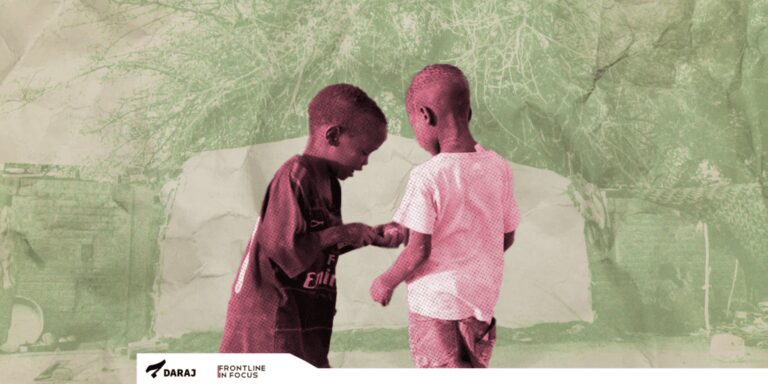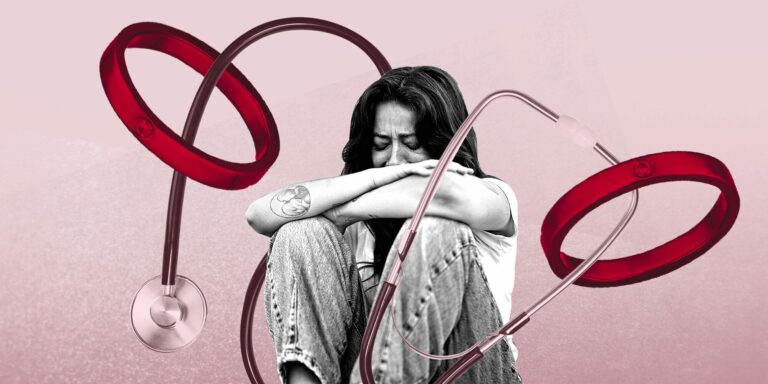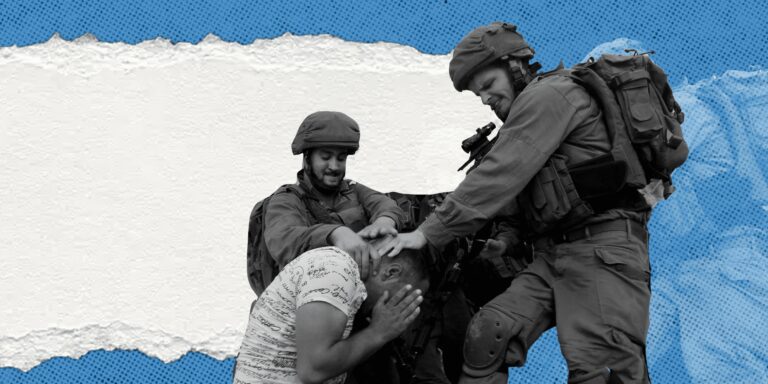Noor woke up early that day, unlike usual. She snuck into the bathroom, hiding the reason for her secret early-rising from bed within her clothes, before anyone in her family awoke.
She turned the key to lock herself in, isolating her frail, trembling body from her family. She opened the box, read the instructions with great fear, and followed them cautiously and without mistakes. In her situation, mistakes were not allowed and could even cost her life. She then sat and waited for the result, which came back positive: pregnant!
“According to the instruction booklet, I had to wait at least two minutes before the result appeared, but I didn’t even get that. Only a few seconds passed before the two red lines appeared, lightning-fast, announcing the catastrophe,” Noor, 20, told Daraj.
At that moment, she began to feel breathless, frozen in place, trying to process the overwhelming feelings of panic. Tears streamed down her face despite her shocked eyes.
Her hands trembled, and she couldn’t remember how she gathered herself and left the bathroom. She went back to her bed to try to sleep, but she couldn’t close her eyes. Her mind was racing with thoughts, imagining the worst and most frightening scenarios that could happen.
On one hand, her parents would not spare her if they found out; her fate would likely be death. On the other hand, she thought about all the dangers of abortion she had heard of, which could even lead to death.
The Shock of Betrayal
She rose from her bed minutes before the alarm went off. Despite the heaviness she felt, she had to dress and leave the house under the pretense of going to university. In reality, she went to meet the young man she had been in a relationship with for three years, the father of the baby growing in her womb.
As soon as she arrived and the door closed behind her, she burst into tears that had been silently suffocating her and told him what had happened with a choked voice.
“Up until the moment I reached his house, I thought the biggest shock I would face that day was the news of my pregnancy. But my shock in him was far greater; he betrayed me and abandoned me in an instant,” Noor added.
His reaction exceeded all her expectations. As soon as she uttered the words, “I’m pregnant, and I need to have an abortion,” he stepped back a little, looked into her bewildered eyes, and said, “This problem is your responsibility. You should have been more careful! Get rid of it without involving me; I can’t afford to be entangled in this mess.”
She left his house and started walking aimlessly, with no specific destination. What had happened was beyond her ability to comprehend. She felt pain, fear, betrayal, abandonment, and loneliness, but unfortunately, she didn’t have the luxury of breaking down and taking the time to wake up from the shock. She had to act quickly to end the pregnancy. She called her close friend, and they met to discuss the limited options available to her.
Dangerous Options
In Lebanon, as in many Arabic-speaking countries, the law criminalizes abortion and punishes the woman and anyone who assists her or provides abortion services.
Therefore, women and girls with unwanted pregnancies face only two options due to legal, religious, and social constraints that do not recognize their ownership of their bodies and that obsessively emphasize their reproductive role.
The first option a woman has is to undergo a secret abortion in a gynecological clinic, which is complicated due to its illegality and high cost. Many doctors refuse to perform the procedure, and if they agree, the fee is often exorbitant.
The second option is to resort to a medication usually used to treat stomach ulcers, which can induce abortion. However, obtaining it requires a prescription, and many doctors refuse to write it because it is “illegal.” Even if they agree, the fee for the prescription and medication is still high but remains less expensive than the procedure.
Noor chose the less costly home abortion and began researching ways to obtain a prescription and purchase the medication. She connected with an organization providing services related to sexual and reproductive health.
One of the counselors at the organization helped her reach a doctor who could send the medication, provided she paid $100 for the prescription and the drug. This was a steep price for a university student living in a country plagued by severe crises, but she had no time to wait and think, so she agreed.
Noor mentioned, “When I finally had the medication in my hands, I felt that the first phase of my arduous journey was over, leading to the second phase, which was even more painful, frightening, and dangerous—the phase of taking the doses according to the doctor’s instructions.”
When she arrived home, she went straight to her room to avoid being seen or arousing suspicion. She lay on her bed, waiting for everyone to fall asleep so she could begin the ordeal of intense pain, mixed with her fear of death, which haunted her. She had heard terrifying stories of girls and women who had died during unsafe home abortions.
Lack of Medical Follow-Up
Noor does not remember the details of what happened after she took the first dose of the medication, which caused her severe intestinal pain. The second and third doses caused very painful contractions in her uterus, signaling the start of the abortion process.
She also does not recall how many times she went to the bathroom or how much blood she lost until the last drop fell, announcing the abortion was complete and the problem was over. At that point, she went to her bed; it was five in the morning. She closed her eyes to sleep, but she would drift off for a few minutes and then wake up terrified and scared, each time wishing that what had happened was just a nightmare she would soon wake up from.
“About two days after the abortion, the pain moved from my body to my nerves, and it settled there. I was haunted by an overwhelming sense of guilt, as if I were a criminal simply because I didn’t want to give birth.”
Noor has not been able to completely rid herself of the guilt, a result of the upbringing that girls and women in our region experience. They are deprived of the right to personal choices and to determine their own sexual and reproductive destinies.
If a girl or woman manages to break free from these constraints, she is punished with stigma for daring to violate customs, traditions, and the concept of “the family”. She defied her “compulsory” reproductive role, which is established by a system that blames girls and women for any unwanted pregnancies and absolves men of any responsibility.
“I am trying hard to rid myself of the psychological effects that accompanied my abortion. I returned to living my life as if nothing had happened, at least to those around me. But for me, my secret will remain hidden in my eyes, and if it is revealed, I will become a disgrace to my family,” Noor concluded.






